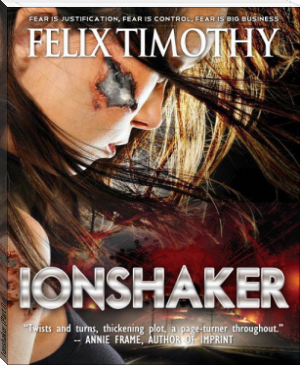Apache Dawn - - (classic fiction .TXT) 📗

- Author: -
- Performer: -
Book online «Apache Dawn - - (classic fiction .TXT) 📗». Author -
Their time was over. He believed there needed to be a truly progressive future for America and he was going to build on his predecessor’s advancement of liberal ideas and make it permanent. Forget change—he was going to recreate America.
“You don’t have to look so happy about this, you know,” the old crone hissed at him while trying to look nonchalant for the impromptu gathering of pool reporters. “We don’t even know if he’s still alive or not and you’re carrying on as if you just won the election.”
Barron ignored the old witch and beamed for the cameras. He was mere seconds away from being sworn in as President of the United States and he was going to relish every single second.
“Have it your way,” she sighed, shaking her gray head. Louder, to call the gathering to attention, she said, “Raise your right hand. Good. Now, repeat after me: I do solemnly swear that I will faithfully execute the Office of President of the United States…”
“I do solemnly swear,” he heard himself say. He was lost in the moment and while his mouth was speaking the rest of the sacred words, his mind was reeling in unabashed joy. The possibilities that lay before him staggered the mind.
“…So help me, God.”
“So help me, God,” Barron said, quickly pulling his hand off the Bible held in the clutches of the old hag. He idly mused what would happen if he appointed some sexy young co-ed just out of law school to the Supreme Court. His party had the power to confirm the nomination in a heartbeat…
“Congratulations, Mr. President,” the venomous harpy said through clenched teeth as she offered a limp, clammy handshake. Her contempt for him was palatable. “May God help us all.”
As the cameras flashed and the reporters jockeyed for position, Harold James Barron, Esq., President of the United States, took a deep breath and smiled for his new nation, he thought, rather ruefully. It was true, he was elated, but he did not want to come off as jubilant. He shook hands with the half-dozen foreign dignitaries rounded up from State, and a few cabinet officials, including the Secretary of Defense.
“Mr. President, we need to speak,” an elderly serious-looking man said in a whisper as he shook the newly sworn-in Chief Executive’s hand.
“President Barron!” called one of the reporters. “Do you have any comment on the civil unrest reported in California? Have you—”
“Okay everyone, the President has a full agenda today, so let’s let him get to work,” said his Chief of Staff as the press was ushered from the Oval Office. The howls of protest from the reporters were pushed aside by a small swarm of Secret Service agents that materialized out of the shadows to clear the room.
The last flash went off and the curved door to the Oval Office hushed shut with a soft click and vanished into the curved, white wall. Harold looked fondly at the massive desk that dominated the far side of the room. It was all his. Just like Reginald had promised.
“Sir,” began the Secretary of Defense. He started to open his briefcase.
The President held his left hand up absently to forestall the stodgy-looking man. He continued to stare at the desk—his desk. Walking over to it, he ran his hands along its glossy, dark finish, admiring the luxurious feel of the ageless desk. It had been the throne of power, the place from which the most powerful men on the planet had dictated terms to entire nations, declared both war and peace. The pinnacle of American political power.
He sank into the plush, leather-upholstered high-backed chair and sighed. Now he was at that pinnacle; he was that man; he was the power. He opened his eyes slowly and a smug smile crept across his face.
“Go ahead, Albert, what have you got for me?” The President twirled in his new chair. Not a single squeak or creak. The taxpayers had spared no expense.
The Secretary of Defense smiled, Harold thought a bit condescendingly, and adjusted the half-glasses on the tip of his nose. “Of course, Mr. President. If you’re sure you’re ready?”
“Proceed,” said the President with a regal wave of his hand. He twirled around in his chair again and stopped after one revolution, smacking his hands on the desk. The loud slap made his Chief of Staff flinch.
“I’m glad you like your chair, sir, because we’re on the fucking brink of World War III here.”
The smile vanished from the President’s face. “Wh—what?” Panic gripped his heart for a split second. Reginald had said, just that morning, that everything was under control! He tried to calm his quickly accelerating heart rate.
The Secretary of Defense sat down heavily in a richly upholstered chair across from the President’s desk. The other cabinet members, NSA, CIA, the Joint Chiefs, and his Chief of Staff all sat on the matching couches, shuffling papers and tablets. The elderly head of the Defense Department took off his glasses and glared at the President with rheumy eyes.
“We have foreign soldiers in…at last count,” he looked down at his papers and held his glasses in front of his face. The crusty, balding old man fixed those hawk-like eyes on Harold again. “…Seven major American cities. Foreign soldiers, Mr. President, on American soil, attacking our cities. And that’s just what we can confirm. With most of our satellites out of commission,” he threw his hands up, “we’re basically blind, deaf and mute. We are cut off from the majority of our forces overseas. It’s like they just vanished.”
“Is this confirmed?” the President asked. He looked over the Secretary of Defense’s shoulder and got a roomful of somber nodding heads.
Admiral Bennet, the leader of America’s Navy, stood up. “Sir,” he said, smoothing out his white dress uniform liberally coated with ribbons and medals, “we haven’t had reliable, let alone consistent, communications with about 80 percent of our naval forces since the attack on our satellites. Mr. President, that was nearly 36 hours ago.” The nation’s top sailor rolled a shoulder and adjusted his dress uniform.
“Ships still in port,” he continued, “have access to landlines, but any forces out at sea are…hit and miss. Sometimes, we can hail a carrier battlegroup but most of the time, all we get is static. We are—essentially—defenseless without the ability to coordinate forces.” The grizzled sailor frowned at his Air Force counterpart. “There could be entire fleets approaching our shores at this very moment and we wouldn’t know it.”
“Don’t look at me, Roger,” said the Air Force Chief of Staff. “We’re in the dark, too. We still have a secure link with the football,” he said, gesturing to the Air Force officer standing quietly at the edge of the room. The officer was holding a large briefcase, handcuffed to his left wrist. The Air Force Chief of Staff then stood up in his dress blues, with an equally large display of medals and ribbons as his Navy counterpart on his puffed-out chest. He nodded toward the President.
“Sir, it’s true, most of our satellite capability has been shut down, but we’re working with the NSA to use some backdoors we re-discovered.”
“‘Backdoors’?” repeated the President with an arched eyebrow. He struggled to push a suggestive image of Jayne from his mind and cleared his throat. “‘Re-discovered’?”
“Yes, sir. Back in the ‘60s and ‘70s, we figured the Russkies would try some anti-satellite warfare, so we built in some emergency access systems into a select batch of civilian birds, like geostationary weather sats. If the Russians took out our military and spy satellites, we could tap into our weather sats and possibly neutral, international communication satellites to carry our own comm-links.”
“You hacked international satellites? That doesn’t sound very diplomatic.” The President could just see the negative headlines flash across the screens.
“Yes, sir,” said the Air Force general. He looked surprised that the President was surprised. “Uh…sir, England, France and Germany, among others—back in the early days—paid us to launch their satellites. We shouldered the risk, we designed and paid for the technology, we supplied the workers, and we supplied the launch facilities. Everything was on us. It wasn’t very hard for our techs to add some extra functionality to those satellites before launch.” He gave a weak shrug. “They never said we couldn’t add some extra communication functionality—and we never asked.”
The President frowned. “Better to beg for forgiveness than ask for permission, right?”
“Yes, sir.”
“All that being said,” growled the Secretary of Defense, “we still are nowhere near the capability we had just last week. We can get through to a few units and bases when these old clunker satellites pass overhead. After that, we have to wait until the next flyover. It’s primitive technology we’re working with, but it’s all we’ve got and it’s working. Barely. It’s leaving us pissing in the wind. If someone decides to take out a few of our forward bases in Iran…they could be wiped out before we even know what the hell is happening.”
“Is that all we have?” asked the President in a gasp of disbelief.
“At the moment, yes sir,” said the Air Force general sadly. He sat down with a sigh.
“So. Mr. President, as I said, we are blind, deaf, and mute,” the Secretary of Defense said. “We have North Korean troops taking ground in Los Angeles and—here’s the real kick in the balls—the last image we had over the Pacific is not good.” He stood up and passed a glossy 8x10 photo to the President.
“Why isn’t this on the screens?” asked the President, motioning to the bank of monitors along the entire length of the far wall, displaying current information about the casualties in Atlanta, the fighting in Los Angeles, and half a dozen other crises the nation currently was facing.





Comments (0)